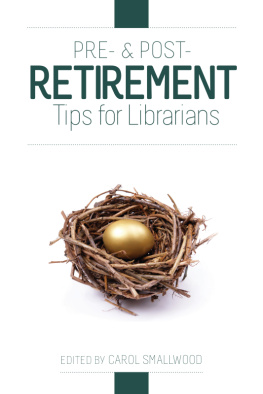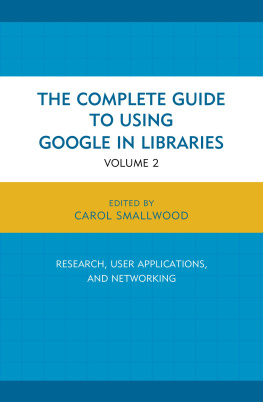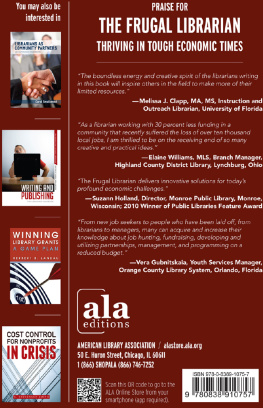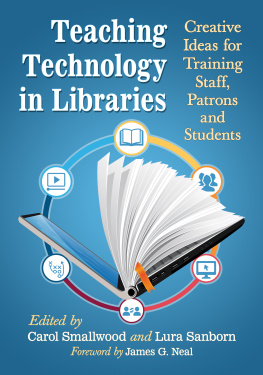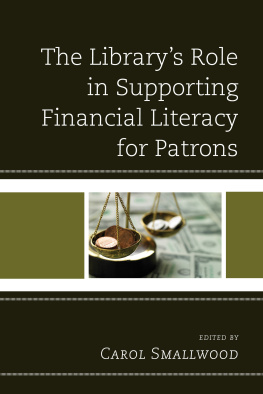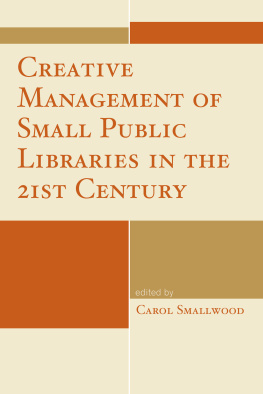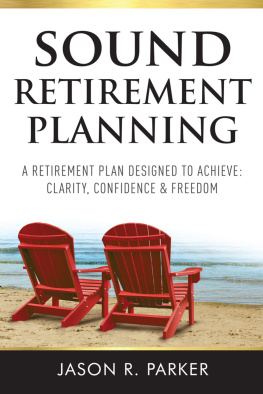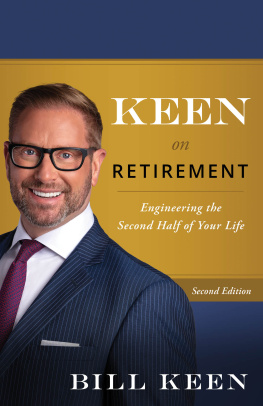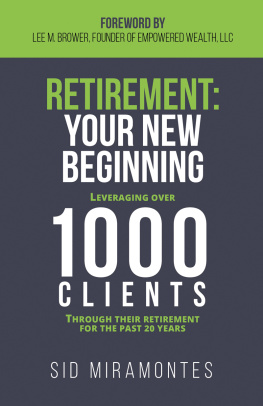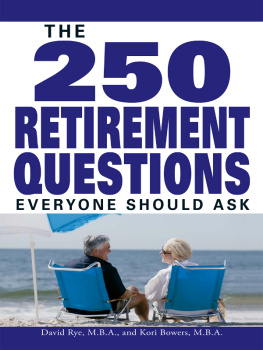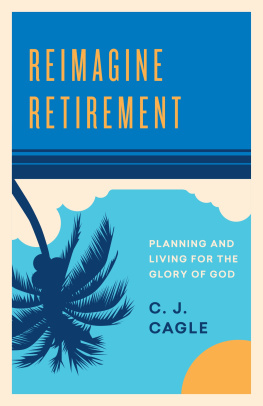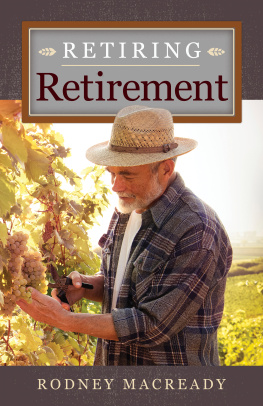Pre- & Post-Retirement Tips for Librarians
ALA Editions purchases fund advocacy, awareness, and accreditation programs for library professionals worldwide.
Pre- & Post-Retirement Tips for Librarians
Edited by Carol Smallwood
American Library Association | Chicago 2012
2012 by the American Library Association. Any claim of copyright is subject to applicable limitations and exceptions, such as rights of fair use and library copying pursuant to Sections 107 and 108 of the U.S. Copyright Act. No copyright is claimed for content in the public domain, such as works of the U.S. government.
2010 Teachers Insurance and Annuity AssociationCollege Retirement Equities Fund (TIAA-CREF), New York, NY 10017.
The Vanguard Group, Inc., used with permission.
Extensive effort has gone into ensuring the reliability of the information in this book; however, the publisher makes no warranty, express or implied, with respect to the material contained herein.
ISBNs: 978-0-8389-1120-4 (paper); 978-0-8389-9369-9 (PDF); 978-0-8389-9370-5 (ePub); 978-0-8389-9371-2 (Mobipocket); 978-0-8389-9372-9 (Kindle). For more information on digital formats, visit the ALA Store at alastore.ala.org and select eEditions.
Library of Congress Cataloging-in-Publication Data
Pre- and post-retirement tips for librarians / edited by Carol Smallwood.
p. cm.
Includes bibliographical references and index.
ISBN 978-0-8389-1120-4 (alk. paper)
1. LibrariansRetirementUnited States. 2. RetirementUnited StatesPlanning. I. Smallwood, Carol, 1939
Z682.3.P69 2012
646.7' 9024002092dc23
2011030071
Book design in Fanwood and Melbourne by Casey Bayer.
Cover illustration prism68/Shutterstock, Inc.
This paper meets the requirements of ANSI/NISO Z39.481992 (Permanence of Paper).
Contents
Linda Burkey Wade
Brett Hammond
Susan Carol Curzon
Donald G. Frank
Maria A. Bruno, CFP
James B. Casey
Rose Parkman Marshall
Jennifer Boxen
Dahlma Llanos-Figueroa
Louise F. Benke
Dorothea J. Coiffe
Sharon Nottingham
Jennifer Tang
Rita Marsales
Mary Redmond
Renee B. Bush
Shirley Lewis
Janet Husband
Sandra Cortese
Patricia H. Atwood
Carolyn J. Rodis and Steven Henick
Brian Fricke, CFP
Susan Montgomery
Jeanne Munn Bracken
To be well prepared is to be well armed. Financial planning and decisions made in early and mid-career can dramatically affect our opportunities in retirement. Pre- and Post-Retirement Tips for Librarians brings those issues into focus. For thousands of boomer librarians like me who are near to or eligible for retirement, the information contained in this volume is critical to the next phase of our life. Although broad in scope, this book contains detailed but easy-to-understand advice about key retirement concerns such as Social Security, developing a spending plan, and maintaining an active lifestyle on a budget.
Many of us have been in the workplace for three or more decades. Making a contribution to our communities and institutions is integral to how we view ourselves. Combined with the characteristics of librarianshipa commitment to advancing lifelong learning, the innovative use of new technologies, and expertise in effectively communicating with peoplewe are uniquely positioned to navigate the challenges of retirement. How to take advantage of what we have been doing every day is what this publication purports to provide, specifically, examples of our skill sets applied to retirement options that are personally and financially fulfilling.
Retired colleagues have often told me that they are busier than ever. Clearly, good health is fundamental to this positive outlook. But also important to them was the exploration of what they would do as retirees and the management of their time and money. Herein librarians will find guidance to chart their future with examples of post-retirement activities and ways to stretch retirement income.
Retiring from a library job does not mean retiring from librarianship. Recently, the American Library Association established the Retired Members Round Table to offer an avenue for sustained involvement with the profession. I urge each of you to join, share what you have learned over the years with newer librarians, and continue to participate in the ALA online and at conferences. Networking with others refreshes the spirit and keeps the mind nimble.
With planning, retirement can be an enormously creative and gratifying experience. I hope that you will find Pre- and Post-Retirement Tips for Librarians a useful tool in plotting a course for your retirement years.
Roberta Stevens
20102011 President of the American Library Association
Vandella Brown, contributor, Writing and Publishing: A Librarians Handbook (ALA 2010)
Anika Fajardo, reference librarian, St. Catherine University, St. Paul, Minnesota; author of The Dish on Food and Farming in Colonial America (Capstone, 2012)
Lisa Fraser, Adult Services Librarian, King County Library System, Bellevue, Washington; The Frugal Librarian: Thriving in Tough Economic Times (ALA Editions, 2011)
Michael A. Germano, business librarian, California State University, Los Angeles; editorial board member, The Bottom Line: Managing Library Finances
Kerol Harrod, writer/coproducer of Library Larrys Big Day, Denton Public Library, Denton, Texas; first-place winner of 2010 TATOA Programming Awards
Dr. Robert P. Holley, Wayne State University, Detroit, Michigan; author of over one hundred articles
Professor David V. Loertscher, SLIS, San Jose State University, writer and publisher, and past president of AASL
Will Manley, American Libraries columnist
Nancy Kalikow Maxwell, author, Sacred Stacks: The Higher Purpose of Libraries and Librarianship (ALA Editions, 2006)
Aline Soules, Library Faculty, California State University, East Bay
Robert G. Weiner, associate humanities librarian, Texas Tech University Libraries; editor, Graphic Novels and Comics in Libraries and Archives (McFarland, 2010)
Pre- and Post-Retirement Tips for Librarians was compiled to provide insight from librarians as well as retirement specialists to fill a gap in the literature. It isnt intended as a source for investment advice. Retirement raises many questions as we enter uncharted waters: each librarians situation is unique and yet similar to colleagues. Our skills give us an edge in planning as well as managing our lives after library employment that deserve to be shared.
I sought chapters on health, relocating, volunteering, going back to work full-time or part-time, financial planning, handling property, oral histories, Social Security, credit, using mediation, psychological adjustment, insurance, and related topics that librarians deal with before and after retiring.
Librarians and retirement planners each contributed 2,500 to 3,500 words; the foreword, which begins To be well prepared is to be well armed, is by the president of the American Library Association, Roberta Stevens, when she was in office.
The book comprises 24 chapters divided into eight parts that deal with how to prepare for retiring, finances in retirement, ways to explore new roads, whether to continue working after retiring, volunteering, health concerns, financial planning, and where to live in retirement.
I ordered and received many materials about retirement through the U.S. Postal Service, my senators and representatives, and the Internet, and wish to mention just a few here:

